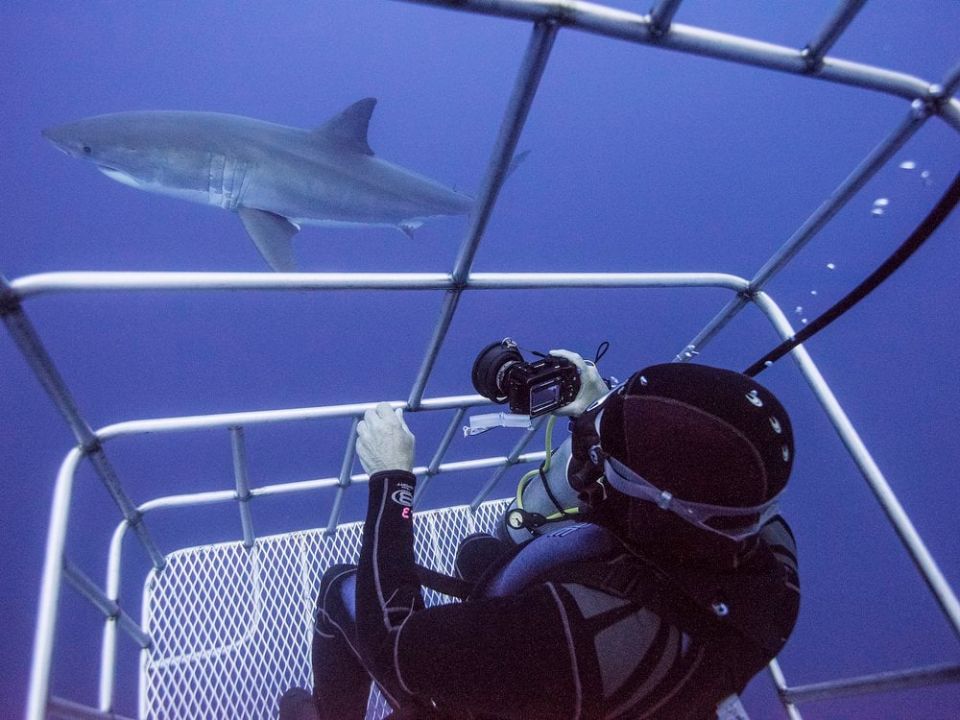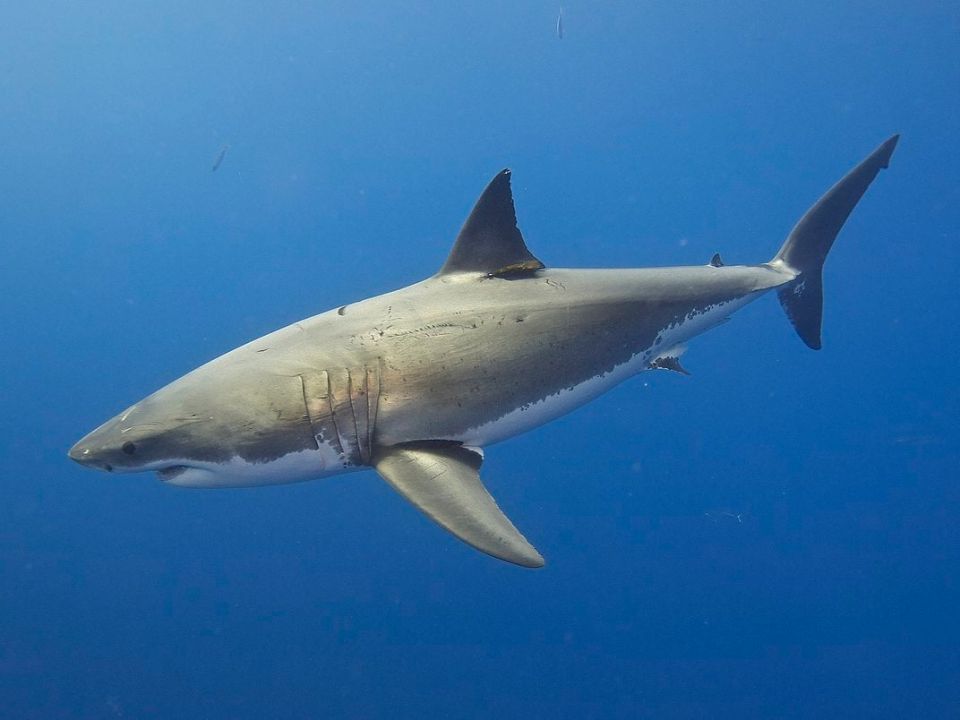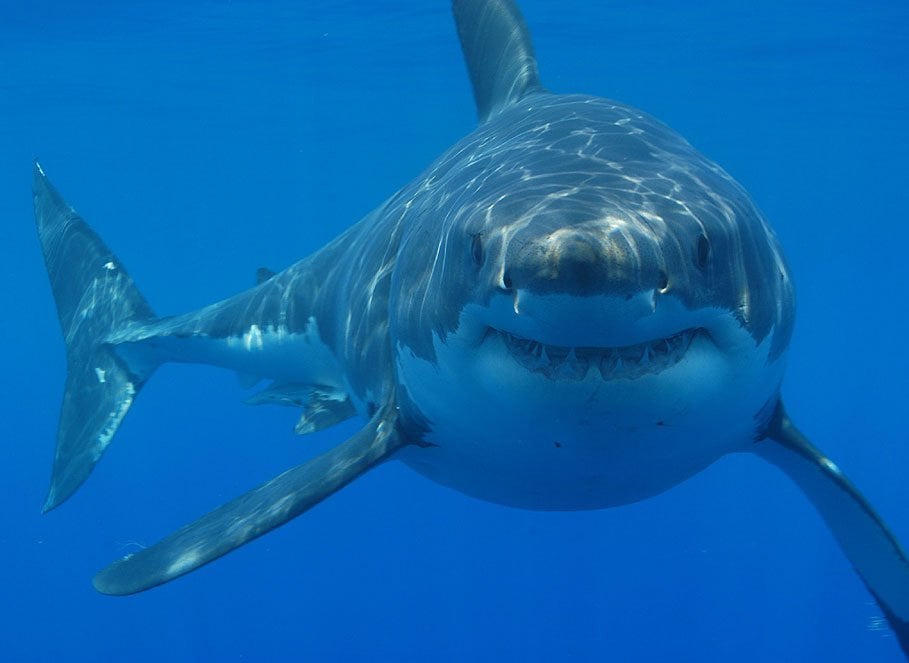The government cited bad practices in the industry as a reason for the ban, which has sparked concerns for the local economy

The Mexican government has banned shark-related tourism activities, including cage diving, at Guadalupe Island.
For the last two decades, tourists and “Shark Week” producers alike have traveled to the waters surrounding a small Mexican island, eager for a chance to get up close and personal with great white sharks. Divers donned gear and took the plunge within submerged cages as the sharks, lured by bait, swam nearby.
Now, however, the Mexican government is putting an end to the practice with an indefinite ban on shark-related tourism activities on Guadalupe Island, which lies in the Pacific Ocean off the coast of Baja California. The new rules, which took effect January 10, are a response to bad practices in the industry, per Mexico’s Ministry of Environment and Natural Resources.
These practices included mishandling the bait used to attract sharks; tourists and film crews swimming outside of cages; drones flying over seal colonies; and pollutant dumping, among other things. Mexican leaders also called out two specific examples: a 2016 incident involving a shark that became stuck in the bars of a cage, sustaining serious injuries, and a similar 2019 incident that likely resulted in the shark’s death.
These tourism activities have put great white sharks at risk, according to the government’s new rules. The ban aims to protect the sharks and conserve their habitat.
The action comes after the Mexican government suspended shark-watching and sport fishing activities from May to December last year so that it could study the issue and determine how best to move forward. Guadalupe Island, located roughly 150 miles off the coast, has been protected as a Mexican biosphere reserve since 2005.
 Tour operators say the ban will limit research on the sharks.
Tour operators say the ban will limit research on the sharks.
While it was meant to protect sharks, the ban also “effectively ends the once-busy Guadalupe Island tourism economy,” which had become largely centered around cage diving, as Lilit Marcus writes for CNN. One study found that the number of cage-diving vessels at Guadalupe Island increased from six to ten between 2014 and 2019. During the 2019 season, an estimated 2,800 people dove in cages to see sharks.
Already, some shark cage tour operators are closing up shop, including Spencer Salmon, who owned the popular San Diego-based Horizon Charters, reports the San Diego Union-Tribune’s Joshua Emerson Smith. Salmon, who helped pioneer the Guadalupe Island cage diving industry, recently sold the business after filing an unsuccessful lawsuit to challenge last year’s suspension, per the company’s Facebook page. Horizon charged $2,000 to $5,000 per person for a five-day trip to Guadalupe Island.
“Unfortunately, the closure of Guadalupe Island has left us financially tapped out,” the company posted on Facebook. “We cannot do the right thing by our divers with $500,000 in refunds and stay in business. So we made the decision to sell the company to a new operator who will be taking the MV Horizon in a new direction at the end of February 2023.”
In addition to the economic impacts, some say the ban will limit research into great white sharks, as cage-diving charter boats offered an easy, cost-effective way for scientists to learn more about the marine creatures. Others fear that, without tour operators in the area, poachers will move in and begin illegally hunting the sharks for their valuable jaws and fins.
“A single set of white shark jaws goes for about $5,000,” says Patric Douglas, a longtime tour guide, to the San Diego Union-Tribune. “White shark fins can go for up to $10,000. It was the fact that we were there for most of the season that protected these animals.”
 Great white sharks typically weigh between 1,500 and 4,000 pounds.
Great white sharks typically weigh between 1,500 and 4,000 pounds.
Proponents also say cage diving and related shark observation activities help reverse the stigma around great white sharks, which have been labeled “man-eaters” since the mid-1700s. Restoring sharks’ reputation can, in turn, encourage more people to support conservation efforts to protect the animals and their marine habitats.
However, wildlife professionals have long raised ethical concerns about cage-diving with sharks. Some worry that chumming the waters and baiting the creatures has changed their behavior and that cage diving puts both humans and sharks at risk. New Zealand banned the practice in 2018.
Great white sharks, or white sharks, are the largest known predatory fish species in the world, weighing between 1,500 and 4,000 pounds and spanning 16 to 20 feet in length. These powerful fish live in a wide variety of locations through temperate areas of the Atlantic, Pacific and Indian oceans, as well as the Mediterranean.
Globally, white sharks have been listed since 1996 as vulnerable on the International Union for Conservation of Nature’s (IUCN) Red List of Threatened Species, which is one step short of endangered. Populations declined throughout the 1980s, then began to rebound in the 1990s with help from conservation laws. However, the fate of the large fish varies from region to region.
“Over three generation lengths (159 years), the white shark is estimated to be increasing in abundance in the Northeast Pacific and Indian Ocean and declining in abundance from historic levels in the Northwest Atlantic and South Pacific,” per the IUCN.
In the U.S., white sharks are not considered an endangered or threatened species under the Endangered Species Act.
Today, white sharks face several threats: entanglement in commercial fishing equipment, climate change, habitat pollution, disease, predation and overharvesting of the animals they eat, per the National Oceanic and Atmospheric Administration.










